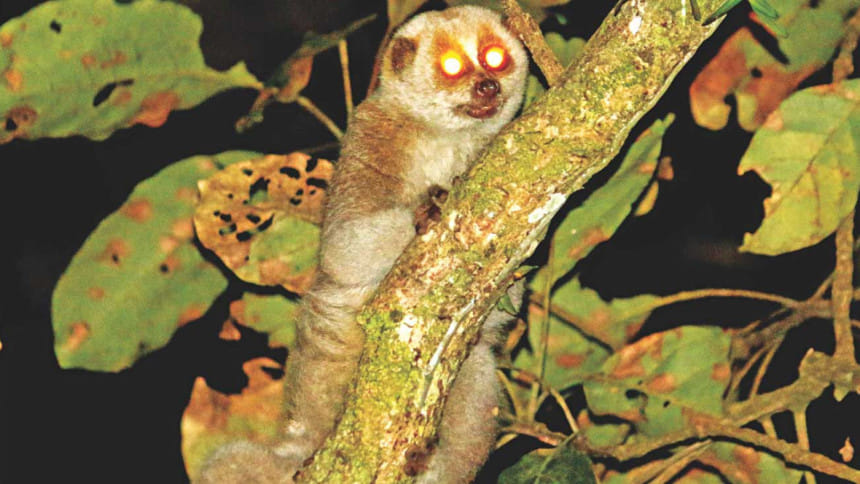Nature Quest: Meet the shy monkey

The Bengal Slow Loris or Lajjabati Banar (Nycticebus bengalensis) is a very shy arboreal animal and is the largest of all the four slow lorises in the world. It is found in the tropical evergreen rainforests, semi-evergreen forests and moist deciduous forests of Bangladesh, Cambodia, China, North-eastern India, Lao and Maynmar. It is 26 to 38 cm long and weigh about 2 kg and is characterised by indistinct facial markings, light-coloured forehead and neck, and usually has dorsal stripes. These are omnivorous, usually feeding on plant exudates, insects, bark and bird eggs. This animal's life span is about 15 years, and the females of the species give birth to one offspring once every two years in semi-wild conditions (Rowe 1996). One of the more curious biological aspects of Slow Loris is the production of a poisonous substance, which may be transmitted through its bite when it tries to defend itself.
These are usually not sighted as they are exclusively nocturnal with slow drliberate movements and during the day time they sleep, curled up like a ball in the hidden parts of trees above the ground. But we were lucky enough to see one four times during our survey on " Impacts of Highway on Wildlife at Satchari National Park" and were able to photograph once in February 2015. According to IUCN, the population trend of Slow loris is decreasing. Until 2007, the IUCN Red list had listed the species as data deficient though in 2008 it classified the species as vulnerable and noted that "the species is predicted to decline by more than 30% in the next three generations over its entire range due to continuing hunting pressures and loss of habitat."
All species of slow loris (Nycticebus spp.) are now strictly protected by the Convention on International Trade in Endangered Species of Wild Fauna and Flora (CITES) under Appendix I, which bans international trade of the animal for commercial purposes. Though we are studying its behaviour on a small scale, major and urgent steps must be taken for its conservation. Therefore, we request the Forest Department, IUCN and other organisations to take immediate steps for conserving it and preventing any further decline of its population.
The writer is a student of the zoology department at Jagannath University.

 For all latest news, follow The Daily Star's Google News channel.
For all latest news, follow The Daily Star's Google News channel. 



Comments